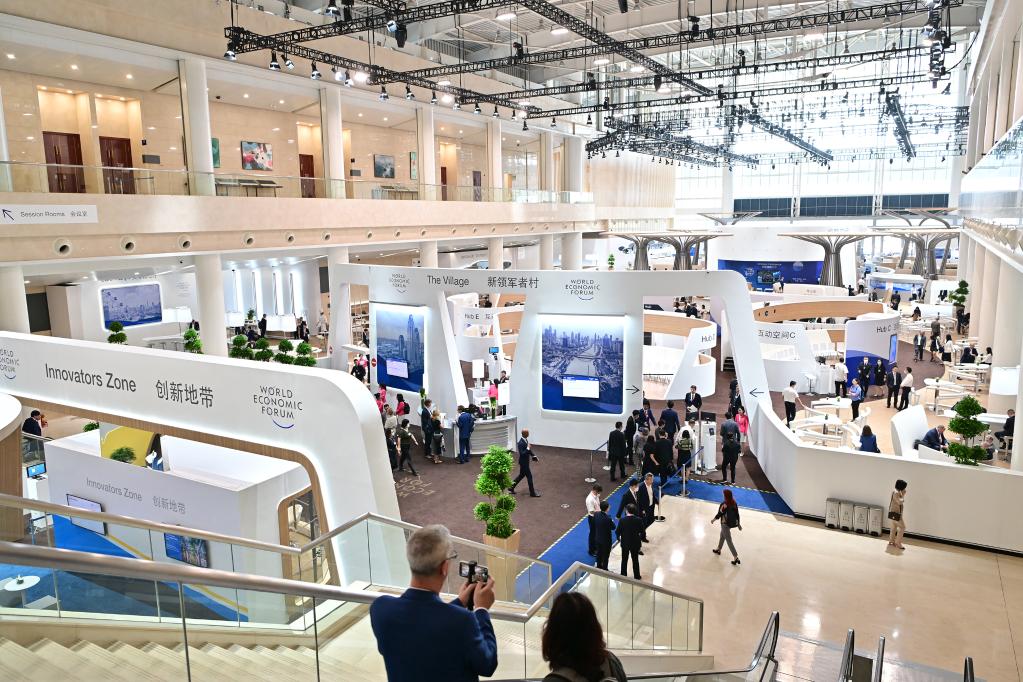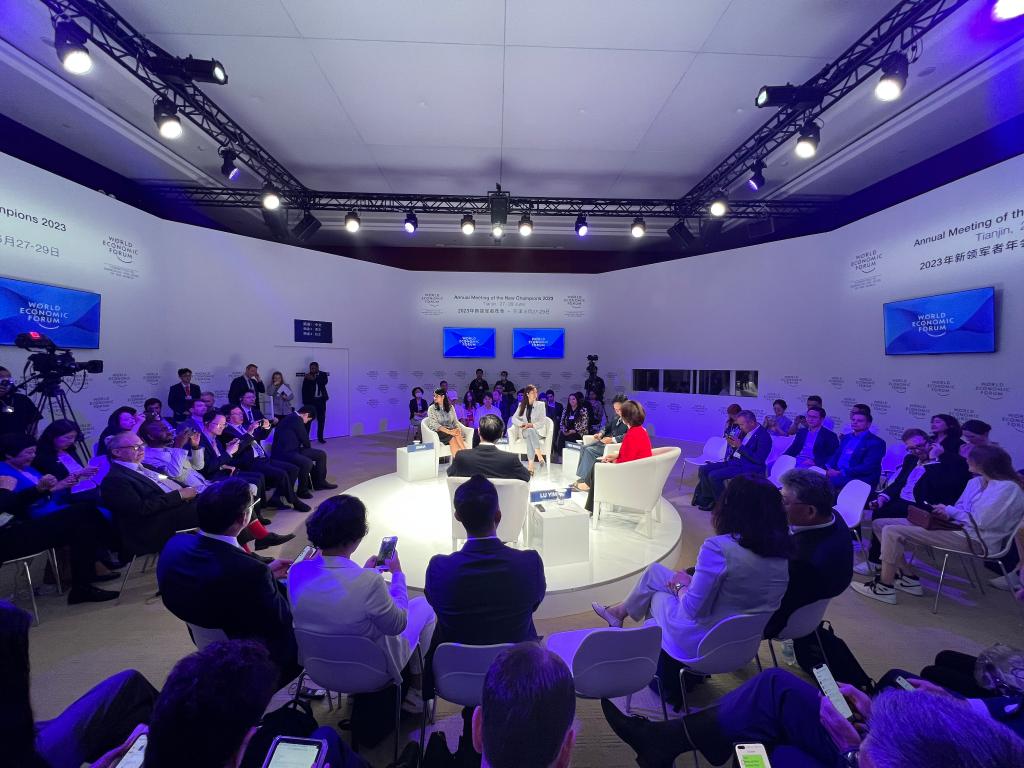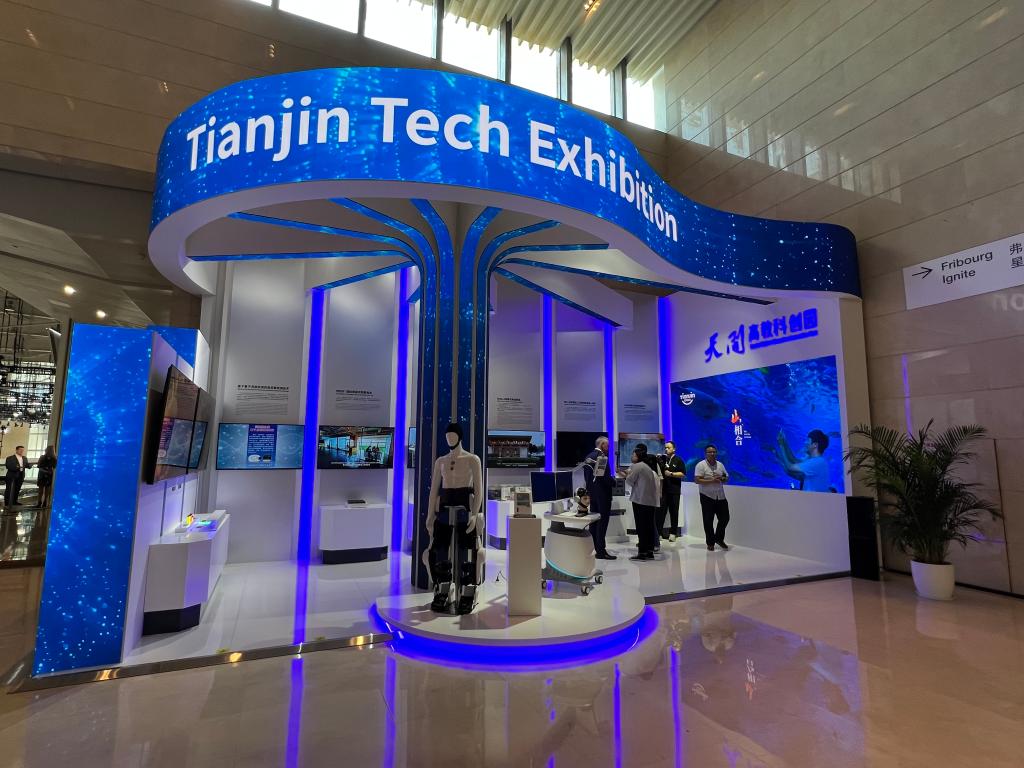Xinhua News Agency, Tianjin, June 29th Title: "Innovation Subversion" or "Life Assistant" — — Observation of "Artificial Intelligence" from Summer Davos Forum
Xinhua News Agency reporter Bai Jiali and Yin Siyuan
"Generative Artificial Intelligence: Friend or Enemy?" "Keep pace with the times: embrace the artificial intelligence revolution and improve the level of artificial intelligence" … … At the Summer Davos Forum held in Tianjin, artificial intelligence once again became a "hot topic" concerned by political and business people, experts and scholars.
As a window for observing the world and cutting-edge dialogue, how do guests discuss the relationship between artificial intelligence and human life at this economic event? In their eyes, will artificial intelligence bring "innovation subversion" or become a "life assistant"?
Life is closely related to it.
At the high-profile Summer Davos Forum, guests from different countries and fields started a dialogue on topics related to artificial intelligence. The reporter observed that a common cognition of the guests was — — With the new wave of artificial intelligence triggered by ChatGPT, artificial intelligence is pouring into all walks of life.
The "Top Ten Emerging Technologies Report 2023" published by the World Economic Forum "Fresh" reveals the emerging technologies that will have the greatest impact on the world in the next three to five years. Among them, generative artificial intelligence and artificial intelligence assisted medical care are listed. The report also pointed out that generative artificial intelligence is developing rapidly and will lead to subversive changes in many industries such as education and research.
Baidu’s ERNIE Bot, Iflytek’s iFLYTEK Spark Cognitive Model, 360 Group’s 360 Wisdom Brain, and brand-new AI mapping tools are changing our way of life and work.

The 14th Summer Davos Forum. Xinhua News Agency reporter Li Xin photo
"In the past six months, nearly 100 companies have entered the generative artificial intelligence market." Zhang Yaqin, academician of China Academy of Engineering and president of Tsinghua University Intelligent Industry Research Institute, said at the forum that artificial intelligence will play a great role in intelligent transportation, intelligent internet of things and intelligent medical care.
In the forum dialogue, Zhao Yan, chairman and general manager of Huaxi Biotechnology Co., Ltd., mentioned a new scene of artificial intelligence application, which may bring more benefits to future women. She believes that artificial intelligence may be able to play the role of "AI assistant" in the future, assisting professional women to complete their work at special times such as pregnancy.
"Artificial intelligence is being applied in all aspects of life and is quietly changing people’s lives." Wang Guan, co-founder of Kezhi Technology and director of the Smart Finance Laboratory of Ningbo Institute of Artificial Intelligence of Shanghai Jiaotong University, said that in the near future, with the blessing of artificial intelligence, people’s lives will undergo tremendous changes.
Medical treatment has become a hot spot of application.
In the forum, a special robot attracted guests to stop. "This is an intelligent diagnosis robot for depression developed by the R&D team of Tianjin University." The staff introduced the new achievements in the field of brain-computer interface research and development to the guests. "Just wearing a device, you can collect the signals of cerebral cortex neurons and pass ‘ Decoding ’ Achieve a quantitative assessment of depression. "
From auxiliary diagnosis, to drug research and development, to medical management, a long history of medicine is colliding with brand-new artificial intelligence, expanding its broad development prospects. The guests predicted that artificial intelligence may become a key promoter of the rapid development of the medical field.
According to Liu Jiren, chairman of Neusoft Group, the diagnosis of diseases by artificial intelligence will make our diagnosis process change from relying on the ability of each doctor to relying on calculation and collective wisdom, which will reduce the difference of medical services.

Forum guests talk about the future of artificial intelligence. Xinhua News Agency reporter Bai Jiali photo
"When researchers conduct experiments, it is likely that they can only do ten or one hundred at a time, but with AI, they can conduct a large number of experiments simultaneously and generate massive data." Ina klassen Berg, chief commercial officer of Ginkgo Biological Studio, explained the positive role of artificial intelligence in promoting drug research and development.
Zhou Xiaping, senior vice president of Novo Nordisk and president of Greater China, said that enterprises have begun to try to speed up the process of drug research and development by using artificial intelligence tools, and at the same time, use artificial intelligence to help patients better manage chronic diseases.
The changes that artificial intelligence has brought to the medical industry are still going deeper. Lu Yimin, general manager of China General Technology Group, said that when the group integrated medical resources, it found that the regionality of medical resources in China was prominent, the deployment cost of innovative technologies was high, and the platform access capacity was insufficient, so the promotion was facing challenges. He believes that with the support of AI, it is possible to solve long-standing problems such as the imbalance of medical resources and improve the quality of primary medical services more effectively.
In the future, security "fences" should be set up.
While the huge potential of artificial intelligence is rapidly released, how to avoid potential security risks? At the forum, the guests had a heated discussion around this topic.
In the face of everyone’s concern, "What jobs will be reduced due to the introduction of AI technology?" Li Dongsheng, the founder and chairman of TCL, believes that new technologies can help improve the revenue and competitiveness of enterprises, thus creating more new jobs and possibilities, so as to achieve a balance between improving labor efficiency and ensuring the well-being of employees.
So what areas should we try to use this technology? Wang Guan said that some areas with zero tolerance for errors should not use generative artificial intelligence for the time being, but for repetitive work that allows mistakes to a certain extent, it can take the lead in docking this technology.

New achievements in research and development such as brain-computer interface in the exhibition area attract guests to stop. Xinhua News Agency reporter Bai Jiali photo
Many guests thought that the biggest problem facing generative artificial intelligence, in particular, was that "there is no way to judge whether the content provided is true or false, and it is possible to fabricate a piece of content to confuse users." Feng Yan, a professor at the Hong Kong University of Science and Technology, bluntly said that in every field that needs to be decided, people have to have the final say, and machines can only provide assistance.
"Generative artificial intelligence can improve life, and the biggest problem it faces in the future is how to improve its accuracy." Alex Zhvoronkov, founder and CEO of Yingsi Intelligent, said.
In the face of known and unknown risks, Zhang Yi, a senior partner of King & Wood Law Firm, who attended the meeting, believes that firstly, laws and regulations should be rationally used to deal with the risks and impacts brought by artificial intelligence, and a governance framework and standards with broad consensus should be formed through laws to form a security "guardrail" and create a more dynamic development environment under its guidance.